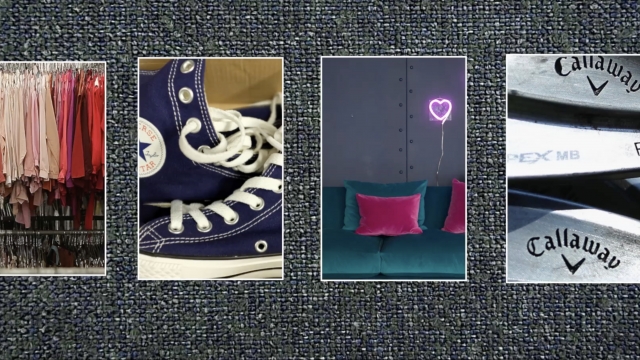The resale market is a roaring rocket offline and online.
It's also known as "recommerce," covering everything from clothes and shoes to furniture and golf clubs.
And we're not talking about Grandma Ruby's favorite frillies stuffed away in the attic. No, these are hot brands like Chanel, Burberry, Nike, Gucci. It goes on and on.
Secondhand clothing is a good barometer of how strong the industry is. Sales are expected to grow from $24 billion in 2018 to $51 billion in 2023, according to ThredUp, a big player in the market.
Those numbers include thrift and donation stores, plus resale stores and sites that are marketplaces for higher-end designer brands.
Sales at those luxury resalers are projected to soar from $5 billion in 2018 to $23 billion in 2023. This is a radical departure from sifting through neighbors' castoffs at garage sales.
Exact numbers are hard to pin down. But take sneakers, for example. Estimates for the resale market range from $500 million to $6 billion. Either way, it's sizable.
A few other interesting stats from ThredUp:
● In 2016, 45% of women bought or were willing to buy secondhand products, including apparel, shoes, accessories, books and furniture. A year later, it was 52%, and in 2018, 64% — almost two-thirds.
● The age breakdown for all secondary shoppers: Millennials, 33%; Boomers, 31%; Gen X, 20%; and Gen Z, 16%.
Not surprisingly, the study finds technology as a driving force: "Mobile apps and personalization have made buying used clothes as easy as buying new."
Online marketplaces like Poshmark, The RealReal, ThredUp and Depop are growing in popularity and helping resale apparel grow 24 times faster than the retail side.
There are two other trends fueling resale growth worth noting — and both are linked to Millennials:
Thriftiness and the Great Recession. Young Millennials saw their parents scramble to recover, and Millennials who were working experienced the fallout more directly. In both cases, the need to be financially smart was hammered home.
Emphasis on sustainability. This simply means that apparel should be designed to last and be circulated cutting down on waste.
When one industry grows, it often creates the need for another industry to support it. The resale market is no exception. If you're buying a name-brand item, you want to know that it is real — worth the money. That's where merchandise authenticators come in. Their expertise is to spot the fakes. Resalers hire these experts to vet the merchandise they are selling. Sometimes shoppers themselves can get verification before buying new in a store using companies like CertiLogo, which employs AI. Authenticity is now at a premium as counterfeiters get more crafty and resales become more common.


